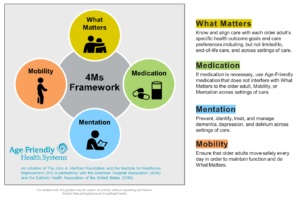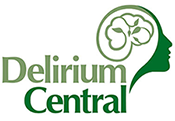Patients & Families
Family Members and Caregivers
Family members, caregivers, and friends are often the first witnesses of a loved one experiencing an episode of delirium, or acute confusion. These resources for family members and caregivers of older adults will give you information about what delirium looks like and provide tips on how to help your loved one before, during, and after a hospitalization.
The role of the caregiver or family member is essential. It is important for a patient to have support and companionship both in the hospital and when he or she returns home. We hope the information on these pages will give you some understanding of delirium and provide options for additional resources for you and your family.

Patients
There are many ways that people can stay healthy and feel their best, both at home and during a hospital stay. This section of the website is for people who would like to know how to best manage challenges that are faced by older adults during the aging process.
We have listed some valuable tips on general healthy living. Important topics include nutrition and physical activity. We have also provided additional resources on how to best manage your hospital stay (see below).
Delirium is a sudden change in mental status, or sudden confusion, which develops over hours to days. It is different from dementia, such as Alzheimer’s disease, which is a condition that develops over many months and years. Any suspected sudden change in mental status should be reported to a medical professional right away.
Delirium causes a person’s mind to become clouded and makes paying attention or focusing thoughts difficult.
The following are some distressing symptoms that may occur when a loved one experiences delirium:
- Difficulty understanding what is happening around them
- Saying things that do not make sense (incoherence)
- Seeing or hearing things that are not really there (visual and/or auditory hallucinations)
- Feeling fearful that people are trying to harm them
- Does not recognize you anymore
- Seem to have a change in personality
These symptoms tend to come and go during the course of the day. Confusion regarding day-to-day events, daily routines, and who certain people are, even family members, is common. Changes in personality can occur. Some persons become quiet and withdrawn while others become stressed, anxious, or “hyper.” Delirium may also cause someone to be awake all night and sleep during the day. It may also cause a disruption in their eating habits. During a delirious episode, some patients do not feel hungry and forget to eat and drink, so caregiver support is important during this time.
Delirium is an especially common and serious problem in hospitalized older patients and requires immediate medical treatment. Delirium can slow the healing or recovery process, leading to more time spent in the hospital. There are some common causes of delirium that have been identified, such as infections, dehydration, side effects of certain medications, or the effect of drugs in the body along with other medical conditions. It is important to report a suspected delirious episode so that a medical professional can find out the cause and begin treatment. The sooner delirium is identified, the faster it can be treated. With quick treatment, delirium may clear within a few days to weeks.
Very likely, experiencing delirium has had a profound effect on you and your loved ones. To help you to understand your healthcare better, we want to bring your attention to an important movement in aging medicine that is sweeping across the nation.
It’s called Age-Friendly Healthcare.
What is Age-Friendly?
The Institute for Healthcare Improvement created the Age-Friendly Health Systems approach that identifies 4 key target areas for successful geriatric healthcare implementation, also known as the “4Ms”:
- What Matters
- Medication
- Mentation
- Mobility
In short, this approach ensures that a hospital or health system is providing high quality, person-centered care for older adults.
Learn how HELP can assist your hospital to become Age-Friendly

Ten Tips to Prevent Delirium
When a loved one is experiencing delirium (acute confusion) during a hospitalization, it can be helpful if possible to have a family member or caregiver be with the patient as much as possible. This will help provide orientation and support and alleviate some of the anxiety caused by being in an unfamiliar setting.

Healthy Living: At the Hospital
A visit to the hospital can be stressful for both patients and family members. It is important to listen to the advice of the nurses and doctors at the hospital, but you should also ask questions to make sure that your body is getting what it needs to recover. Daily attention to the basic needs of the human body can help prevent medical problems and help your body heal from illness and hospitalization. [Visit here] for some simple suggestions that you and your family members can follow in order to have a more positive hospital stay.

Healthy Living: At Home
Much of the information on this website is about assisting older patients when they are in the hospital. However, there are many things older adults can do before or after a hospital visit that may help them live healthier day to day lives. There is growing evidence that keeping your body healthy also helps your mind. The top three ways to maintain a healthy brain are physical activity, a healthy diet, and mental activity.

Patient & Family/Caregiver Resources
It is important for patients and family members to ask questions about their care and to advocate for their needs. The resources on this page may help you work with the healthcare system and receive the best care possible. You can also utilize a Patient Advocate, Ombudsman, or Patient Representative who may be able to help you in working with healthcare professionals or to assist you in learning more about the issues that matter to you.






